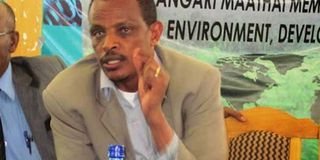Tanzanian students set for Ethiopia satellite launch

What you need to know:
- Ethiopia is collaborating with universities and observatory centres from around the world including the United States, United Kingdom, France, Italy, Spain, Russia, South Korea, Chile and South Africa.
- Students from Tanzania, Rwanda and Uganda will Ethiopian experts in the launching of the first earth observatory satellite in September 2019.
Addis Ababa/Dar. Space programme students from Tanzania, Rwanda and Uganda are expected to join Ethiopia experts in the launching of the first earth observatory satellite in September 2019.
Ethiopia now joins a list of few African countries that have put the devices into orbit.
The masters and PHD students at the Addis Ababa University are among 60 students who will also take part in research and training at the space institute-country's multibillion-dollar Entoto Observatory and Research Centre.
The director general of the Ethiopian Space Science and Technology Institute at the Addis Ababa University Dr Solomon Belay Tessema said 20 Ethiopian aerospace engineers were involved in the satellite project.
“The satellite will be launched from China while the control and command station will be in Ethiopia," he said, adding "most preliminary and critical design is done by our scientists.”
China has provided training and $6 million for the project, according to Dr Solomon.
He said design, development and manufacturing of the satellite was done in collaboration with the Chinese at the cost of $8 million.
“We have two main goals for launching this first satellite including building technology application capacity and skills to our engineers through collaborations with different countries’ space scientists and institutions," said Dr Solomon.
He noted that technology and knowledge transfer will enable Ethiopian scientists to "design, build and launch the second satellite independently."
The Entoto observatory centre, the only of its kind in the region, has two one-metre telescopes and a spectrograph to measure wavelengths of electromagnetic radiation.
Ethiopia is collaborating with universities and observatory centres from around the world including the United States, United Kingdom, France, Italy, Spain, Russia, South Korea, Chile and South Africa.
According to him, the second goal was to save the country from spending money buying data and information it could collect for its development agenda.
He said the satellite will be used to gather data on water, agriculture, climate change and the environment.
The country will be among the seven African countries that have built and launched satellites including South Africa, Egypt, Nigeria, Ghana, Algeria, Morocco, and neighbouring Kenya - which launched its nano-satellite in May 2018.
Angola launched its first satellite in December 2017 but lost it four months later. Russia, which built the communication satellite, is building another one for Angola set to be launched in 2020.
In 2017, the African Union passed an African space policy calling for the adoption of a framework to use satellite communication for economic progress and the development of a continental outer-space programme.




